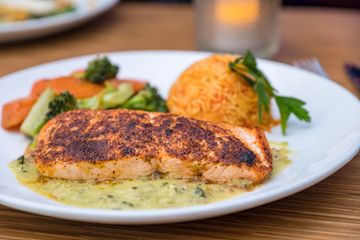Explore top picks on the lunch and dinner menu at your local spot
Is Mexican Food Healthy? Unboxing the Nutritional Benefits of Standard Active Ingredients
The question of whether Mexican food is healthy welcomes an exploration of its conventional active ingredients. Beans and corn act as foundational staples, rich in healthy protein and fiber. Avocados give useful fats, while different natural herbs and seasonings add flavor and health and wellness advantages - take out and delivery. Together, these components produce a tapestry of nourishment. The healthiness of Mexican cuisine typically depends on preparation techniques and part sizes. What function do these variables play in establishing its total dietary worth?
The Power of Beans: Healthy Protein and Fiber-Rich Staples
Although often forgotten, beans function as a cornerstone of Mexican cuisine, offering a wealth of dietary advantages. Rich in protein, they are an excellent plant-based choice for those seeking to satisfy their dietary protein requires. This high healthy protein content sustains muscle mass fixing and growth, making beans invaluable for both meat-eaters and vegetarians alike. Additionally, beans are a remarkable source of nutritional fiber, which helps in digestion and promotes a sensation of volume, possibly assisting with weight management.
The range of beans utilized in Mexican recipes, such as black beans, pinto beans, and kidney beans, adds to a varied flavor account and can enhance meals nutritionally. Beans are low in fat and contain important vitamins and minerals, consisting of folate, magnesium, and iron. Together, these attributes make beans an important ingredient, delivering both nourishment and sustenance in standard Mexican fare.

Corn: a Versatile Grain With Nutritional Perks
Corn stands apart as a versatile grain basic to Mexican cuisine, commemorated not just for its culinary applications but also for its impressive dietary account. As a primary component in dishes like tortillas, tamales, and pozole, corn provides essential nutrients that add to a balanced diet. Rich in carbs, it functions as a significant power source, while additionally being reduced in fat, making it a beneficial option for different dietary requirements.
Moreover, corn is a great source of nutritional fiber, which aids in food digestion and promotes satiety. It includes significant quantities of vitamins such as B-complex vitamins, which are important for energy metabolism. The visibility of antioxidants, specifically carotenoids, contributes to total wellness by decreasing oxidative stress and anxiety. Additionally, corn is gluten-free, dealing with those with gluten sensitivities. Generally, the dietary benefits of corn highlight its value in traditional Mexican food and its role in a healthy and balanced diet regimen.
Avocados: Healthy Fats and Nutrients in Every Bite
Avocados play a considerable role in Mexican cuisine, enhancing dishes with their luscious appearance and rich taste. Beyond their cooking charm, avocados are celebrated for their impressive dietary account. They are a rich resource of healthy and balanced monounsaturated fats, which can help reduced negative cholesterol levels and assistance heart health. Furthermore, avocados are loaded with crucial vitamins and minerals, including potassium, vitamin E, and B vitamins, adding to total wellness.
The high fiber content in avocados help digestion and promotes satiation, making them a beneficial addition to any type of dish. Their one-of-a-kind nutrient make-up can additionally sustain skin wellness and supply anti-inflammatory advantages. Including avocados into conventional Mexican meals or appreciating them as a standalone snack can boost both taste and nourishment, demonstrating why they are a precious staple in Mexican cuisine. In general, avocados use a delicious method to appreciate healthy and balanced fats and important nutrients in every bite.

Herbs and flavors: Flavorful Health And Wellness Boosters
While appreciating the abundant tastes of Mexican food, one can not neglect the essential role that spices and herbs play in improving both taste and health. Components such as cilantro, chili, and oregano peppers not only contribute to the dynamic flavor account but also supply substantial health lunch and dinner and wellness advantages. For example, cilantro is understood for its cleansing properties, aiding to remove hefty metals from the body, while oregano is packed with antioxidants and has anti-inflammatory impacts.
Chili peppers, a staple in lots of Mexican meals, contain capsaicin, which has actually been connected to improved metabolic rate and discomfort relief. In addition, flavors like cumin and coriander support digestion and might aid in blood sugar law. Integrating these flavorful wellness boosters into meals not only boosts the culinary experience yet likewise promotes general well-being, making Mexican food not simply tasty, but additionally nutritionally beneficial.
Traditional Food Preparation Methods: Enhancing Nourishment and Flavor
Standard cooking approaches in Mexican cuisine play a crucial function in boosting both nutrition and taste, as they typically focus on fresh components and time-honored strategies. Methods such as nixtamalization, where corn is saturated and cooked in an alkaline option, not only enhance the nutrient profile of tortillas yet additionally boost their digestibility - mexican food. Additionally, using slow food preparation methods, like stewing or braising, enables tastes to meld magnificently while preserving the integrity of the components
Regularly Asked Concerns
Are Mexican Food Portions Typically Larger Than Various Other Cuisines?
Mexican food parts are frequently bigger than those of many other foods. This characteristic shows typical dining techniques, emphasizing common sharing and hearty dishes, which can result in an extra considerable offering size generally.
How Does the Preparation Technique Affect Healthfulness of Mexican Food?
Preparation techniques substantially influence the healthiness of Mexican food. Techniques such as barbecuing or steaming preserve nutrients, while frying can boost harmful fat content. Options of components and cooking designs ultimately identify overall nutritional value.
Can Mexican Food Be Tailored for Certain Nutritional Restrictions?
Mexican food can certainly be tailored for certain nutritional constraints. Replacements, such as making use of corn tortillas for gluten-free diets or incorporating more vegetables, allow individuals to take pleasure in typical tastes while suiting numerous nutritional needs.
What Are Typical False Impressions Concerning Mexican Food and Wellness?
Usual false impressions concerning Mexican food consist of the idea that it is naturally harmful, overly spicy, and solely concentrated on fats. In truth, typical recipes usually include nourishing components and can be tailored to numerous nutritional demands.
Are There Healthier Choices at Mexican Restaurants?
Much healthier choices at Mexican restaurants often include barbequed meats, beans, and fresh veggies. Picking meals that stress entire ingredients and staying clear of hefty sauces can lead to an extra healthy dining experience, advertising general well-being.
The selection of beans utilized in Mexican dishes, such as black beans, pinto beans, and kidney beans, adds to a varied flavor account and can enhance meals nutritionally. Avocados play a substantial function in Mexican cuisine, matching meals with their velvety structure and abundant flavor. Integrating avocados into traditional Mexican meals or appreciating them as a standalone snack can boost both flavor and nourishment, demonstrating why they are a cherished staple in Mexican cuisine. While appreciating the rich tastes of Mexican cuisine, one can not ignore the vital role that spices and herbs play in improving both taste and health and wellness. Standard food preparation methods in Mexican cuisine play an important duty in improving both nourishment and flavor, as they usually prioritize classic techniques and fresh active ingredients.